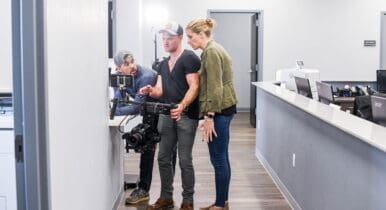The Best Advice I Ever Got as a Consultant
Those with long-term staying power in the campaign industry, writes Democratic strategist Marty Stone, are the consultants who actually put the client first. Making money on the product comes second.

Image Credit: Art Wager
It wasn’t easy to take, but the best advice I got when I was starting out in the industry was: No one wants your advice. Clients, they meant, weren’t going to pay me, an experienced campaign professional, to pick my brain. After nearly 22 years as a phone consultant, I still remember getting that counsel and how it helped my brother Paul and I launch and grow our firm.
Before we opened our doors in 2000, I had done five separate cycles with the DCCC and one cycle with the DSCC, along with running for Congress myself. While working for the committees, I earned a salary but never got any retirement benefits because, at the time, you had to be on staff for two full years before that kicked in. So somehow, I was never on for a full two years as they’d hire me four months into the cycle, or something like that. Sneaky huh!
After that, I knew I wanted something different, so I partnered with Martin Hamburger and Dawn Leguens at their media firm. I liked doing media, but I didn’t love it. It kept me on the road almost as much as I had been for the DCCC, which is probably why I didn’t love it. I just wanted to get off the road.
So I started calling the people I respected who were successful political consultants already. I said, “I want to start a firm with my brother Paul, what’s your advice?” I got lots of it, but two things absolutely stuck with me. One was from Doc Sweitzer, who told me, “You’re setting up a firm; you need a philosophy behind what you’re doing.”
Our Doc-inspired philosophy: We’re doing phones; we want to have conversations with people. We believe conversations move people to action. Whether that’s voting, giving money, or taking legislative action. That was great advice from Doc, but sadly it doesn’t pay the rent. Eventually, it doesn’t pay for retirement, and it doesn’t really allow for hiring people. So it’s just kind of a smart thing.
Then Rich Schlackman said to me, Marty, you need a product. No one is going to just pay you for your brain. As experienced as you are, you just can’t go and hang a shingle there; they’re just not going to pay you. Or they’re not going to pay you enough. You need a product to mark it up and be able to scale your operation.
As we looked to grow the firm, we found it so much easier to talk to people about our products and how that fits in with other aspects of a campaign, whether that’s mail, TV, or polling. For example, when I started doing phones, people had been calling me for general advice, and I was giving them advice for free. And I knew I couldn’t spend all my time just giving away free advice, so I actually felt relieved when I found a product. I could say, “On top of this advice on how you should do your budget, or how you should set up your fundraising, or who you should hire for manager, I have this product you should consider.” That made it a lot easier for me and still allowed me to help friends with their budgets or fundraising plans.
A product also gives you the ability to scale your business. For example, it’s tough to scale, say, opposition research. How many opposition research books can you do? I’ve only seen one company that did it right, and that’s when Ace Smith was in the opposition research business. Ace was able to scale with a number of people doing separate parts of the opposition research book.
Fundraising, my first love in politics, has the same challenge. A fundraising consultant is paid on a retainer basis and can only handle so many events and call time. That’s not a product you can scale or build on.
This brings me to my next point: You also must be able to add to your offerings. We started out almost 22 years ago doing just auto calls, then we added live calls of all the various varieties. Then in 2006, we discovered telephone town halls, which became a massive part of our business. Then legislative patch-through work became a big part of our business. Then expanding into non-profits and helping them communicate with their members.
Pollsters are in a similar position. Any pollster that’s making money now has long ago added focus groups, and they’re all modelers, too. When I’m on a campaign call, the pollster is not only talking about how they’re going to do a poll, but they’re also going to do these focus groups, and then this model. They’ve diversified.
That said, having a product puts you in the ultimate consultant quandary. It’s basically: Are you just a product pusher, or are you looking for the client to win? When I was at the DCCC, I worked on hundreds of different races and saw a whole lot of consulting teams, and the best teams were often the ones where people pushed for what was right to do strategically rather than making more money themselves.
For example, a good media consultant would argue, “The polling says we need to message on X. X is not a good TV issue. I think we should mail on X. Or this is a better message carried on phones.” The media consultant was actually saying, “Don’t give me the money, put it here, so we win.”
The actual folks in this business who have the long-term staying power put the client first, and making money on the product comes second. If that’s how you come at it, people will know you’re not just going to push phones or TV or mail or digital. The people I don’t like working with on a campaign are the consultants who, when it’s the closing weekend of an election, are flying a team out to, say, Las Vegas the Saturday before the election in order to put up a new ad the Monday before Tuesday’s vote — all while the current ads are working fine. I think that’s somebody just being a schnorr – just trying to get as much money out of it as they can.
I think people see that. This is a business where you work with the same people often. It’s hard to work with the folks who think their thing is the only thing you need because you really need a good mix to win.
Young consultants also need to remember that it’s a relationship game — a long-term relationship game. For example, consider the digital people with no campaign background who tell you the only thing you should do is digital. Well, they will likely not be around two years from now. So they must find a way that their product works with other products.
When I got into phones, for the next five to six years, there were a lot of people who set up phone firms. I guess it seemed easy. And almost all of them are gone, in part, because they were only just pushing their product. I think the same sort of shake out probably happens in digital. The digital firms that are thriving right now are actually political consultants first, and the ones that don’t do well are some big tech firm that thought, “oh my, there are billions of dollars in politics, let’s go get our piece.”
Really good consultants will help out, whether that’s with the campaign’s fundraising or field or debate prep. They’re willing to do stuff that doesn’t make them money but helps the campaign. But, of course, it also helps their reputations, and your reputation is what matters in this business.
Marty Stone is the co-founder of Stones’ Phones.

